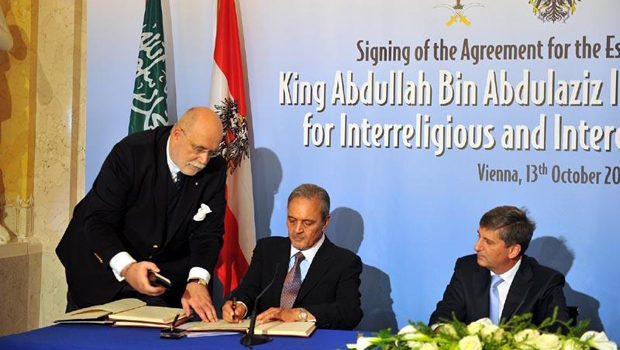Austrian Foreign Minister Michael Spindelegger signed the founding document Thursday along with his Spanish and Saudi counterparts Trinidad Jimenez and Prince Saud Al-Faisal.
"The dialogue with and between religious communities is more important than ever and indispensable for long-term peace and security," Spindelegger said, pointing to deadly sectarian clashes in Egypt earlier this week.
The center, named after Custodian of the Two Holy Mosques King Abdullah and due to open its doors in mid-2012, was to provide a setting for this debate, he went on.
Prince Saud said the forum will be "free of any political influence." "Saudi Arabia will pay for everything that is needed because it believes in this center," he added.
Speaking to reporters earlier, Prince Saud accused Tehran of "murder and mayhem" and said the Kingdom was working on a "measured response" to an alleged Iranian attempt to assassinate the Saudi ambassador in Washington.
He also said the Kingdom would hold Iran accountable for "any action they take against us."
Two men, including a member of Iran's Quds Force, were charged in New York federal court on Tuesday with conspiring to kill Saudi Ambassador Adel Al-Jubeir.
Prince Saud, who also signed a bilateral agreement for consultations with Austria during the trip, emphasized that the mission of the King Abdullah Center would be to promote virtues, respect for human beings irrespective of their religions or race and the prevention of vices, among them, intolerance and racism. Islam prohibits the misuse and abuse of religion, he added.
He said Austria was chosen for this center because it already hosts major international organizations.
He pointed out that the initiative to set up the Vienna dialogue center was launched by King Abdullah back in July 2008 at the World Conference on Interfaith Dialogue held in Madrid.
Jimenez said the three signatory countries put in place this center with an aim to prevent conflicts and to promote peace and understanding among diverse religious groups. She added: "The center aims to become an institution of excellence for dialogue between people of different faiths and cultural backgrounds."
The King Abdullah Center will have a nine-member board representing five major world religions. The Vatican was also expected to send an observer. The president of its Pontifical Council for Interreligious Dialogue, French Cardinal Jean-Louis Tauran, attended the signing Thursday.
On the objectives of the Vienna center, a statement released by the Foreign Ministry in Riyadh said: "The opening of the center would lead to the conducting of a number of interfaith and cultural dialogue programs besides interreligious discussions to promote world peace and peaceful coexistence of the followers of different faiths.
King Abdullah Center will cooperate with other centers and institutions that work to foster greater understanding between followers of various religions and cultures, it added.
Austria is inhabited by the people of diverse faiths and cultures including a large number of immigrants. Muslims are the largest religious minority in Austria, accounting for about 5 percent of the total population. A Saudi-funded mosque was built in Austria in 1979.










